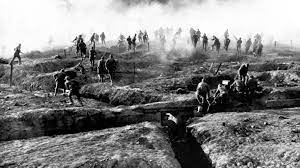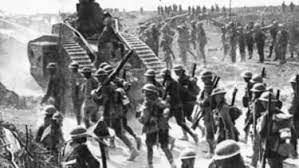When it comes to the history of the world, there are few events that have had a greater impact than World War I. Lasting from 1914 to 1918, this war involved many of the world's major powers and resulted in the loss of millions of lives. In this article, we will provide a comprehensive overview of the history, summary, causes, combatants, and facts related to World War I. Our aim is to provide a high-quality resource that will help you better understand this important historical event.
History of World War I
World War I began on July 28, 1914, when Austria-Hungary declared war on Serbia. This declaration came after the assassination of Archduke Franz Ferdinand of Austria, which had been carried out by a Serbian nationalist. The declaration of war led to a series of alliances being activated, which drew in more and more countries into the conflict. By the end of the war, more than 30 countries had been involved in the conflict.
The war was fought on multiple fronts, with battles taking place in Europe, Africa, and Asia. Some of the most famous battles of the war include the Battle of the Somme, the Battle of Verdun, and the Battle of Jutland. The war also saw the introduction of new technologies such as tanks, submarines, and airplanes, which changed the nature of warfare forever.
Summary of World War I
World War I was a global conflict that involved many of the world's major powers. The war was fought between two main alliances: the Allies, which consisted of the United Kingdom, France, and Russia, among others, and the Central Powers, which consisted of Germany, Austria-Hungary, and the Ottoman Empire, among others.
The war was fought on multiple fronts and involved the use of new technologies such as tanks, submarines, and airplanes. The war resulted in the loss of millions of lives, with estimates ranging from 8.5 million to 16 million deaths. The war also had a significant impact on the geopolitical landscape of Europe, leading to the collapse of empires and the formation of new states.
Causes of World War I
The causes of World War I are complex and multifaceted, with many factors contributing to the outbreak of the conflict. Some of the main causes of the war include:
Nationalism: There was a growing sense of nationalism and patriotism in many countries, which led to tensions between nations.
Imperialism: Many countries were competing for colonies and resources, which led to increased tensions and rivalries.
Militarism: Many countries were building up their military forces and preparing for war, which created a sense of paranoia and distrust between nations.
Alliances: Many countries had formed alliances with each other, which meant that a conflict between two countries could quickly escalate into a global conflict.
Assassination of Archduke Franz Ferdinand: The assassination of Archduke Franz Ferdinand of Austria was the immediate trigger for the outbreak of the war.
Combatants in World War I
World War I involved many of the world's major powers, with more than 30 countries being involved in the conflict. The two main alliances were the Allies and the Central Powers.
The Allies consisted of the United Kingdom, France, Russia, Italy, and the United States, among others. The Central Powers consisted of Germany, Austria-Hungary, the Ottoman Empire, and Bulgaria, among others.
Facts about World War I
👉🏿World War I was the first global war in history.
👉🏿The war lasted from 1914 to 1918.
👉🏿More than 30 countries were involved in the conflict.
👉🏿Some of the most famous battles of the war include the Battle of the Somme, the Battle of Verdun, and the Battle of Jutland.
👉🏿The war saw the introduction of new technologies such as tanks, submarines, and airplanes, which changed the nature of warfare forever.
👉🏿The war had a significant impact on the geopolitical landscape of Europe, leading to the collapse of empires and the formation of new states.
👉🏿The Treaty of Versailles, which was signed in 1919, formally ended the war.
👉🏿The war resulted in the deaths of many civilians, as well as soldiers, and had a significant impact on the home front.
Conclusion
World War I was a global conflict that had a profound impact on the world. The war was fought between two main alliances, the Allies and the Central Powers, and involved more than 30 countries. The war was fought on multiple fronts and resulted in the loss of millions of lives.
The causes of the war are complex and multifaceted, with many factors contributing to the outbreak of the conflict. The war saw the introduction of new technologies such as tanks, submarines, and airplanes, which changed the nature of warfare forever.
Overall, World War I is an important historical event that is still relevant today. By understanding the causes, combatants, and facts related to the war, we can gain a better understanding of the complexities of the world we live in.
FAQs
Q1. When did World War I begin and what triggered the conflict?
A1. World War I began on July 28, 1914, when Austria-Hungary declared war on Serbia after the assassination of Archduke Franz Ferdinand of Austria by a Serbian nationalist.
Q2. Who were the main alliances in World War I and what countries were part of each alliance?
A2. The two main alliances in World War I were the Allies and the Central Powers. The Allies included the United Kingdom, France, Russia, Italy, and the United States, among others. The Central Powers included Germany, Austria-Hungary, the Ottoman Empire, and Bulgaria, among others.
Q3. How many countries were involved in World War I and where were some of the major battles fought?
A3. More than 30 countries were involved in World War I, and the war was fought on multiple fronts. Some of the major battles took place in Europe, Africa, and Asia, including the Battle of the Somme, the Battle of Verdun, and the Battle of Jutland.
Q4. What were the causes of World War I?
A4. The causes of World War I were complex and multifaceted, with factors including growing nationalism, imperialism, militarism, alliances between countries, and the immediate trigger of the assassination of Archduke Franz Ferdinand of Austria.
Q5. What were some of the impacts of World War I on the world?
A5. World War I resulted in the loss of millions of lives and had a significant impact on the geopolitical landscape of Europe, leading to the collapse of empires and the formation of new states. The war also introduced new technologies, such as tanks, submarines, and airplanes, which changed the nature of warfare forever.










